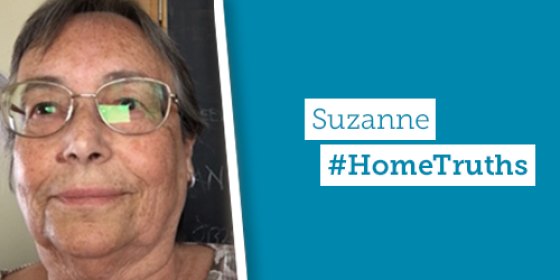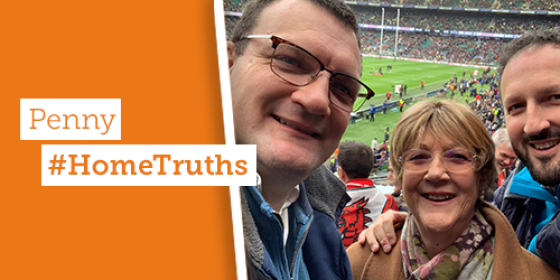 Home Truths: Mrs Bennet and other stories
Home Truths: Mrs Bennet and other stories
Why do you currently receive social care support? What support do you receive?
I have had carers coming in since the end of 2006 – the main reason they started was when I came out of hospital from a hip replacement – it is a difficult recovery period and I had a hole through my hip. I have had issues with chronic fatigue since 2004.
My carers come in and help with putting on my support stockings, washing feet and changing socks, they also help with breakfast and emptying the dishwasher, and drying the washing. They help with most things which require physical effort. I have help with a shopping call and domestic tasks to keep my place reasonably clean.
My house is cleaned about two hours each week; this means that things don’t look like a ‘normal house’, it is mainly about prioritising cleaning the kitchen and bathroom.
Have you seen any changes in the care you receive during this period?
Some of the carers are dealing really well with the situation, some are more stressed. I did hear about a care home nearby where some of the carers left because of the stress of the current situation.
I do feel like I am offering a counselling service at some stages with my carers. I trained as a Christian listener and worked at Citizens Advice, so I am fairly good at listening and getting people to open up.
The care provider I’m with have been good at keeping to the time slots for when my carers come so far. However, I’m currently seeing lots of new carers and having different ones every day while absences are being covered. In an ideal world older people would be seeing the fewest possible number of people – there is a difference between ideal and reality.
What is your biggest concern about your care at the moment?
I am concerned about the number of carers I receive – I have about ten carers a week who see at least a dozen people in a day. When I started doing the maths I realised that I have huge amounts of direct and indirect contact which statistically increases the risk of coronavirus coming into my home
I also haven’t seen any introduction of Personal Protective Equipment (PPE) for carers. The only real change is the change I have instigated. When my carers arrive, I ask them to wash their hands when they come in and they now put on gloves to provide personal care and to prepare food.
Apparently, PPE has arrived for the carers to use, but they have been told they are only allowed to use it if they are treating someone who has been diagnosed with COVID-19.
Do you think there are any changes which could be made to improve the system for those receiving care during the coronavirus outbreak?
Under the circumstances, I think it would be reasonable to give the staff the option to wear the PPE when they are doing up-close care, regardless of whether the person they are caring for has a diagnosis of coronavirus or not.
We also need to think about who is going to be tested next, what are the priorities? If I were the family of someone in a residential care home at present, I would think that the testing of staff and residents would be really important. This is a confined community, whereas carers going into different homes need testing for themselves and the people they are caring for. If the virus gets into that kind of environment I think we would see an awful lot of deaths.
Carers have an important role – one minute they are expected to be a hairdresser, the next time they are expected to be a chef, they do all sorts of other things. I don’t think we appreciate them enough as a society and hopefully the coronavirus outbreak will highlight just how important they are.
Anne wanted to remain anonymous.
During the COVID-19 pandemic, Independent Age is calling on the government to ensure all people in later life are able to access the high-quality care they need. This includes vital care delivered within individual’s own homes, as well as residential care.
Maintaining a high level of care in these environments is imperative to ensuring the safety of people as they get older.
If you’d like to support Independent Age to campaign for change to support people in later life, you can join our campaign network by signing up to receive our emails.
 Home Truths: Supporting my community
Home Truths: Supporting my community
 Home Truths: At Easter
Home Truths: At Easter